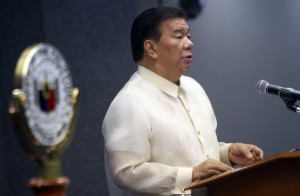Congress is no hurry to give Aquino crisis power
MANILA, Philippines—Congress is not rushing the grant of emergency powers to President Benigno Aquino III to avert a looming energy crisis, deciding instead to determine first whether the country really needs additional generating capacity.
Senate President Franklin Drilon on Friday said it was too early for Congress to decide whether to grant Mr. Aquino authority to contract additional 300 megawatts of power to avert brownouts in the summer of 2015.
Drilon said the Department of Energy (DOE) had not submitted a draft resolution on the grant of authority to the President.
The Senate energy committee has set a series of hearings on the resolution, he said.
“First, there is no draft resolution coming from the DOE. In fact, the hearing is being conducted upon the resolution of Senator [Sergio] Osmeña and my resolution,” Drilon told reporters.
House probe
In the House of Representatives, Speaker Feliciano Belmonte Jr. and Majority Leader Neptali Gonzales II directed the energy committee yesterday to open an inquiry, in aid of legislation, into “the need to establish additional generating capacity” to ensure the country’s energy requirements.
The congressional decision frustrates the DOE’s attempts to hasten the grant of emergency powers to Mr. Aquino. The department has said there may not be enough time to rent or buy generators unless an emergency powers measure is passed this month.
The DOE is considering a number of options to fill the projected energy shortfall, including leasing or purchasing generators, which will cost the government P6 billion (for lease) to P10 billion (for purchase), and a voluntary program tapping the excess capacity of private companies, which will cost much less.
Energy Secretary Jericho Petilla has said that Congress must pass a joint resolution giving the President emergency powers by this month, as contracting for the lease or purchase of power generators will take three months.
Third option
But the House leadership is leaning toward the third option, the interruptible load program (ILP), which is similar to a program in Mindanao that gives incentives to businesses to generate their own power requirements and save energy.
“[The House version is] possibly ILP. That’s for us. We have not heard from the Senate, so the advice is we will check first,” Belmonte told reporters on Thursday.
The Senate is also looking to tap the private sector to avert the projected power shortage next summer.
In the absence of a DOE draft resolution, the Senate committee on energy opened hearings on Drilon’s and Osmeña’s resolutions on Thursday.
But after the first hearing, Osmeña, the committee chair, said he was not amenable to granting President Aquino the authority requested by DOE officials.
Cheaper way
If at all, Osmeña said it would be cheaper to buy from the participants in the so-called interruptible power load, where private generators could sell their excess capacity to the grid.
In that hearing, Petilla said the government was seeking an authority to buy or lease an additional 300 MW only as a “last resort.”
And given the time constraints, the government preferred that no competitive bidding be held for the purchase or lease of modular generator sets, Petilla said.
Under the Electric Power Industry Reform Act, Congress may allow the “establishment of additional generating capacity [on] such terms and conditions as it may approve.”
The law forbids the government to contract additional generating capacity.
RELATED STORIES
Senate tackles Aquino request for emergency powers
Petilla will explain Aquino emergency powers before Congress
